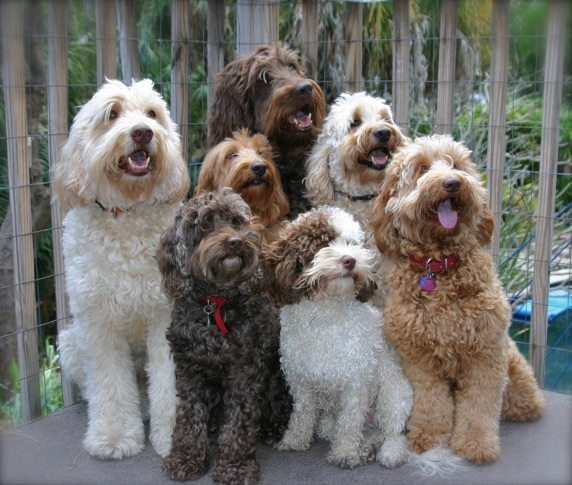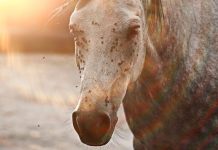The Goldendoodles : You only need to visit the home of your friend who owns a golden doodle dog to understand how amazing a designer dog is. Just as you stepped into the compound, you would be greeted by a petite puppy, jumping and barking at you in a low tone. And just as you are about to say “what breed is this,” you’d see the same dog running in the direction of the littlest kid in the family and tending to their needs as though it’s been programmed to do so.
 Right there on the spot, you’d be WOWed by the friendliness, smartness, and high intelligence of a dog of that size.
Right there on the spot, you’d be WOWed by the friendliness, smartness, and high intelligence of a dog of that size.
This is exactly why many dog owners love the Goldendoodle. Although they’re no watchdog, they can still fill in for one if need be – a fact that’s exemplified by their ability to jump and bark in a low tone when a stranger or a guest comes knocking at the door of their owner.
But before you go ahead to purchase your own Goldendoodle, you should know that for all their beauty, smartness, and awesomeness, Goldendoodles are not completely without their own health issues too.
Although the goal of creating this breed was to mix the intelligence and hypoallergenic properties of the Poodle with the Golden Retriever’s temperament and laid-back personality, they’re still susceptible to some of the conditions that affect Golden Retrievers and Poodles. But, of course, the chances of a Goldendoodle being affected by these conditions are much more reduced than what you find in an average Poodle or Golden Retriever.
Possible health issues of a Goldendoodle

Health conditions that come from the Poodle side
- Hip Dysplasia: This is a genetic condition that results from the hip socket not forming properly and becoming dislocated in the end.
- Hypoadrenocorticism: This is a hormonal disease that results from the insufficient production of cortisol and aldosterone.
- Patella Luxation: Closely related to the dysplasia, this condition causes the dog hip to be dislocated.
- Hyperadrenocorticism: A stark opposite of the hypoadrenocorticism, this disease – which is also known as the Cushing’s Disease – results from the overproduction of cortisol. Cushings treatment for dogs can be treated in many different ways
- Epilepsy: they can sometimes experience conditions like seizures, confusion, unresponsiveness, and breathing difficulty.
- Progressive Retinal Atrophy: As your dog grows, you need to look out for any condition that causes your dog’s eyes to appear weird or different from usual. Common symptoms you need to look out for include night vision difficulty, glassy eyes, and dilated pupils. Usually, the retinal atrophy affects the dog’s retina directly, and if not treated in time and properly, it might cause the dog to go blind.
- Bloat: Pray your dog doesn’t ever develop a bloated stomach because if it does, then the most likely mode of treatment will be surgical operation. Bloat occurs when the dog’s stomach twists and traps air inside.
- Hypoglycemia: This is a condition that results from a sudden drop in sugar levels. It is most prevalent in the toy and miniature Poodle breeds within the first four months after birth. As a result, some Goldendoodle puppies do exhibit similar conditions after birth too. So, don’t be too surprised if you find your miniature Goldendoodle displaying any sign of hypoglycemia in the first few months you brought him home.
Health conditions that come from the Golden Retriever side

- Patellar Luxation
- Hip Dysplasia
- Cancer: The cancer rates of Golden Retrievers are well documented.
- Cataracts: Retrievers are known to suffer from cataracts the most. This condition, which is known to cause poor vision, can lead to blindness if not addressed quickly.
- Ear infections: Goldendoodles take those adorable long hair and cute long floppy ears from their retriever side. Unfortunately, due to these features, they’re also susceptible to ear infections from dirt, bacteria, and fleas.
- Skin conditions: No thanks to their longer outer coat and denser undercoat, retrievers are always susceptible to skin-related diseases such as atopic dermatitis. This disease causes itching at first, but due to the continual scratching and rubbing from the dog, it leads to further skin damage, other infections, irritation, and discomfort.
- Chest-related issues: Don’t ever bet against a retriever developing a heart, lungs, and other circulatory systems conditions. A typical chest-related disease common with retrievers is the Subvalvular aortic stenosis.
Healthiest generation of Goldendoodle

- F1 or First Generation Goldendoodle: results from mixing a purebred Poodle with a purebred Golden Retriever.
- F1b Goldendoodle: results from mixing an F1 Goldendoodle with a purebred Poodle.
In terms of overall health, the first generation, F1, is still the healthiest generation. However, when you’re looking for a dog that sheds the least, then your best bet will be the F1b generation because this generation has the higher percentage of Poodle – Poodles are renowned for their non-shedding and hypoallergenic nature.
The further down in the generation they go, the better the dog is for people suffering from allergies because the dog has the higher percentage of Poodle in them.
Experienced breeders like ABC Puppy Zs know how to mix the right generations to produce the perfect family-dog for you and your loved ones.






























